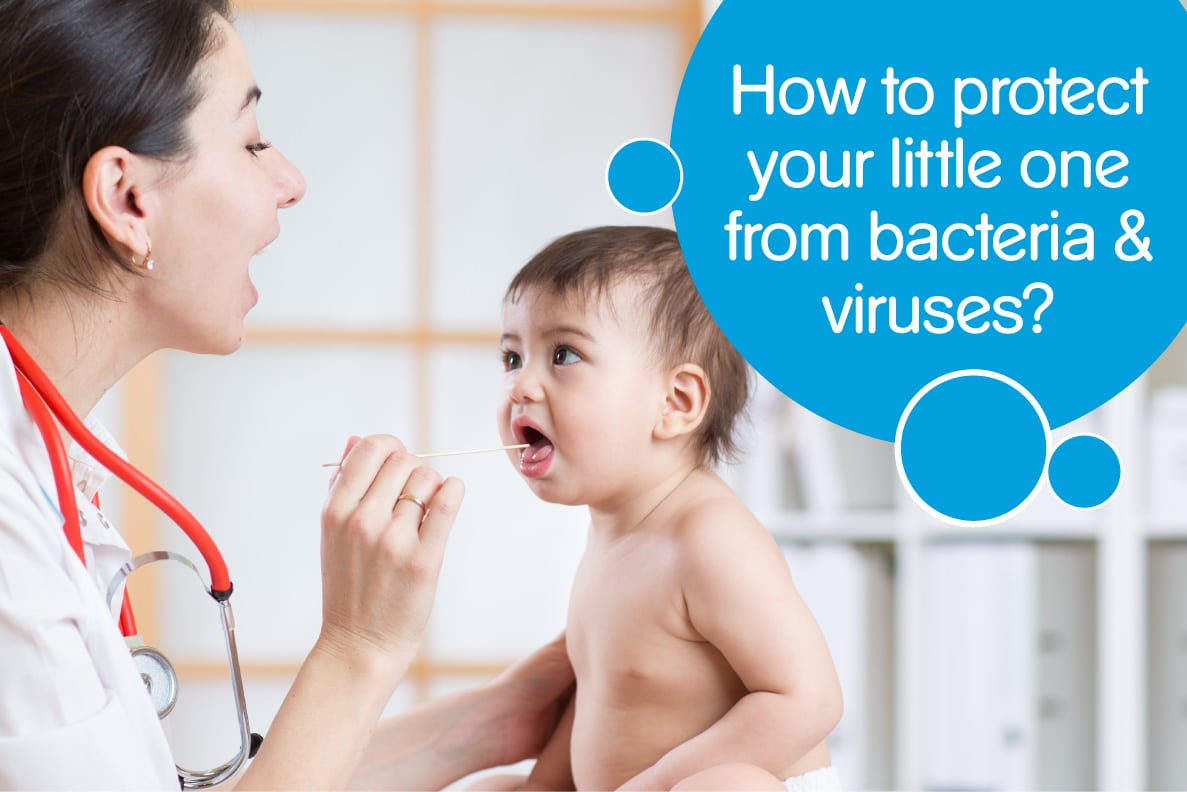How to protect your little one’s from germs?

Babies get sick more often because their immune systems are not yet fully developed. Therefore, as parents, you must take the necessary precautions and protect your little ones from infectious agents.
Understanding your newborn immune system:
Babies are like fortresses with few guards inside. Thier skin and the mucous membranes of their mouth and nose can become infected. Breast milk provides babies with an ample supply of infection-fighting white blood cells that line the intestines and even swim to the lungs to fight off germs that may have entered the body.
However, when harmful bacteria enter a newborn’s body, especially in the first four months after birth, they can take over and cause infections that are very uncomfortable, causing babies to wake up at night with a stuffy nose or a very serious life to lead. – Looming troubles. That is why it is important to vaccinate their babies in the first few months.
Understanding baby health:
Understanding baby health: Babies do have a weak immune system. They crawl on the dirty floor, touch dirty surfaces, and chew toys. Chewing on toys increases during teething because it soothes the baby. They also cry a lot, which causes them to gulp more air faster. This can result in an air obstruction in the stomach and cause colic. Woodward’s Gripe Water relieves colicky babies of abdominal pain and bloating.
Babies tend to reach into everything, so take the following precautions to keep them safe from germs:
1. Wash hands regularly:
Most infectious diseases are transmitted by touch. Get in the habit of washing your hands at regular intervals. Participating in household chores such as cleaning, cooking, or washing up causes germs to build up on the skin. So always wash your hands with mild soap and water or use an alcohol-based hand sanitizer before holding your baby.
2. Avoid visitor numbers:
Feel free to act like a mama bear. What you ask of your guests is entirely up to you. And if they can’t obey your rules, they won’t be able to meet your child right away. Consider asking your guests to ensure that they:
- Are vaccinated
- Stay away when they are sick
- Wash hands well
- Wear a mask
- Keep some distance between them and your baby.
3. Wear clean clothes:
Make sure everyone in the family wears a clean t-shirt. Put a notice on your front door instructing all visitors to promptly wash their hands and put on an enormous t-shirt (have a stack of clean ones at the door) before hugging you and glomming you up with their germs. When it comes to communicating your new “house rules,” the sign will save you a lot of time and effort. Most cold and flu viruses can survive for 8-12 hours on various surfaces such as clothing. Remember that sick person who sneezed on you on your morning bus ride? Those germs are likely to stick with you throughout the day, right up until you go home to hug your child.
4. Keep your hands to yourself:
Many parents are unaware that they can catch cold by touching things and then passing the germs to your eyes, nose, and mouth. Germs are spread by contact, not simply by breathing the same air (though if someone sneezes or coughs near you, germs can travel via droplets). So, you don’t have to be a complete hermit with your child. You are free to take her outside.
Consider this: Your baby will not become ill because you went to a restaurant, but the baby may become ill because you opened the door to the restaurant and then brushed your hand across their cheek. Cold and flu germs can survive for up to two days on nonporous surfaces such as door handles. So, be careful what you touch, and wash those hands!
5. Use baby wipes or soft tissue papers:
Avoid using handkerchiefs to clean your baby’s face or running noses, which can be problematic because the children are being re-exposed to the virus. Wet and medicated skincare baby wipes and tissue papers are gentler on the skin than a fabric handkerchief. The best thing is that they can be easily discarded after usage.
6. Keep your house clean:
The most active carriers of dangerous germs and viruses include mosquitoes, ticks, fleas, and bugs. Your child is an easy target for them. In order to prevent mosquito breeding, look for any standing water nearby and around. To prevent mosquito reproduction, keep your community clean of rubbish, discarded containers, and bins.
7. Sanitising feeding bottles & toys:
Sterilize the feeding bottles and nipples after you purchase it. After that, you can usually wash it with a mild soap and water. Now toys are another ball game, babies tend to hold the dirty toys and chew them. Doing so, the germs are transferred into their system causing infections. Make sure to sanitise the toys frequently and wipe the baby’s hands after they come in contact with the toys.
8. Vaccination schedule:
Vaccination is the most efficient and safest strategy to prevent life-threatening diseases and disorders in newborns and young children. However, parents ignore this crucial factor in the well-being of their children.
Only when the signs and symptoms become apparent do the parents hurry to the hospital for a vaccine. Vaccination against diphtheria, tetanus, and whooping cough (pertussis) (DTaP), polio (IPV), rotavirus (RV), influenza (flu), and measles, mumps, rubella (MMR) is required in infancy.
Precautionary measures – Is it permanent?
Keep in mind, you don’t have to live in a germ-free world forever. It’s just for the first 3-4 months that you must take extra care because the chances of newborn infection arising is very common. Practice the best protection measures to avoid colic, or any other infections in your babies.
